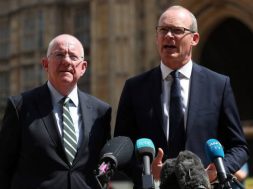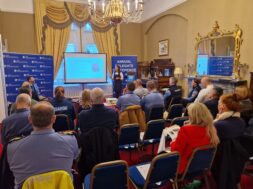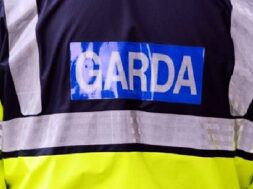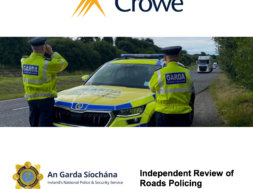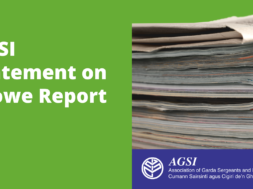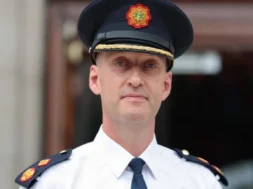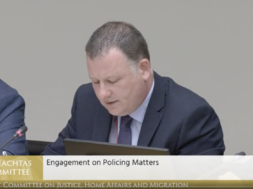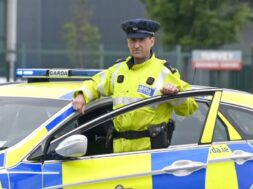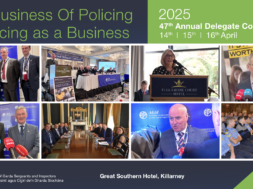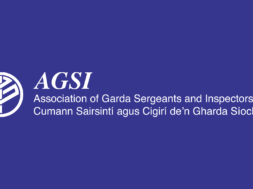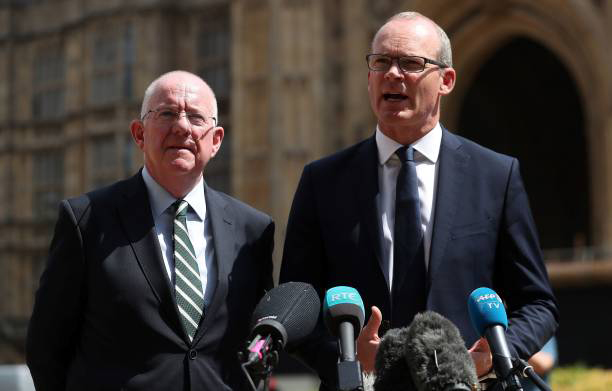
Ministers Coveney and Flanagan welcome publication of the first report of the Independent Reporting Commission
23 October 2018
The Minister for Justice and Equality, Charlie Flanagan, T.D. and Tánaiste and Minister for Foreign Affairs and Trade, Simon Coveney T.D. welcomed the publication today of the first report of the Independent Reporting Commission.
The Report sets out the Commission’s assessment of progress to date on the implementation of the provisions of the 2015 Fresh Start Agreement that are designed to tackle paramilitary activity and associated criminality, and bringing an end to paramilitarism in Northern Ireland.
The report finds that twenty years after the Belfast/Good Friday Agreement, the continuation of paramilitarism remains a stark reality of life in Northern Ireland.
It also highlights the significant adverse impact on the efforts to implement the Fresh Start Agreement initiatives that the absence of the Northern Ireland Executive since January 2017 is having, while embracing the twin-track approach set out in the Fresh Start Agreement.
Speaking on the Report’s publication, the Minister for Justice and Equality, Charlie Flanagan, T.D. said, “This first report of the Independent Reporting Commission is really important. It is an opportune reminder to all of us of the continuing adverse impact on society in Northern Ireland of the culture of paramilitarism.”
“The Commission expresses strong confidence in the whole-of-society approach to ending paramilitarism set out in the Fresh Start Agreement and reports good progress across a range of measures. A striking feature of the Report is the strong and clear correlation displayed between the locations of paramilitary activity within areas of social and economic disadvantage in Northern Ireland. I urge people on all sides in Northern Ireland, especially those in positions of political influence, to engage fully in this process of positive change for the people of Northern Ireland.”
The Tánaiste and Minister for Foreign Affairs and Trade, Simon Coveney T.D. said
“I welcome the first report of the Independent Reporting Commission.
The Commission plays a vital role in monitoring and supporting the implementation of the commitments made by the UK and Irish Governments and the Northern Ireland Executive under the Fresh Start Agreement to bring an end to paramiltarism in Northern Ireland.
The Commission’s report makes clear the range of areas where there needs to be an Executive in place in order to fully and effectively implement the Executive’s Action Plan for tackling Paramilitarism, Criminality and Organised Crime.
It is another reminder of the importance of getting the power-sharing Executive and Assembly in place again to address the issues of most importance for people in communities across Northern Ireland.
On behalf of the Irish Government as a co-guarantor of the Good Friday Agreement, I will continue to work with the Secretary of State for Northern Ireland and the leaders of all of the political parties in Northern Ireland to seek to support a way forward that can secure the necessary agreement on a new Executive as soon as possible.”
Ministers Coveney and Flanagan expressed thanks to the Commissioners and their staff for this Report and congratulate them on their work to date.
ENDS.
Notes for Editors
- The Fresh Start Agreement was concluded on 17 November 2015. It included measures aimed at ending paramilitary activity in Northern Ireland.
- The Northern Ireland Executive, on the basis of recommendations from an expert panel, published the Executive Action Plan for Tackling Paramilitarism, Criminality and Organised Crime on 19 July 2016. It contains 43 commitments in response to the Panel’s recommendations.
· To facilitate monitoring of the implementation of measures to address paramilitarism, the Fresh Start Agreement provides for the establishment by the two Governments of the Independent Reporting Commission (IRC). Legislation has been enacted in Ireland and the UK to establish the IRC. - The IRC’s functions are to
- report annually on progress towards ending continuing paramilitary activity connected with Northern Ireland (or on such further occasions as required);
- report on the implementation of the relevant measures of the three administrations – critical here will be the NI Executive’s Strategy to tackle paramilitary activity and associated criminality; and
- consult the UK Government and relevant law enforcement agencies, the Irish Government and relevant law enforcement agencies and, in Northern Ireland, the Executive, PSNI, statutory agencies, local councils, communities and civic society organisations.
- The IRC is a four-member body. Mr. Tim O’ Connor, former Secretary General to the President was nominated by the Irish Government. The UK Government nominated Mr. Mitchell Reiss, former US Special Envoy to Northern Ireland. Prof. Monica McWilliams and Mr. John McBurney were nominated by the Northern Ireland Executive.
Key Findings
- Twenty years after the Belfast/Good Friday Agreement, the continuation of paramilitarism remains a stark reality of life in Northern Ireland. The IRC makes clear that this is unacceptable while also outlining the reasons why paramilitarism continues to exist as a residual legacy of the conflict.
- The IRC believes that the Fresh Start Agreement provides a credible template for changing that trajectory and constitutes a first-ever attempt at a comprehensive and holistic policy approach in terms of tackling paramilitarism – combining a policing and criminal justice response with a holistic approach to the systemic and social deprivation issues affecting communities.
- The gives a general description of the paramilitary landscape from the perspective of the IRC. It highlights the broad spectrum involved in paramilitarism today – from those who use paramilitarism to cover serious criminality, to those who wish to transition to a situation where paramilitarism doesn’t exist but feel duty-bound to stay connected to their paramilitary organisations to ensure that others make that journey as well, with a range of others in between these points.
- The report provides data on paramilitary activity and on indices of deprivation, on a ward-by-ward basis across Northern Ireland. This data puts into stark relief the correlation between continuing paramilitary activity and social and economic deprivation. The IRC considers that this strongly validates the analysis of the Fresh Start Agreement that only through a comprehensive, holistic approach, which combines traditional criminal justice and policing functions with addressing the systemic issues in communities, can paramilitarism be definitively brought to an end.
- The IRC set out the steps that have been taken so far in furthering this twin-track strategy and the structures that have been devised to implement the measures and actions involved.
- These steps include the Executive Action Plan of 2016 to implement actions to end-paramilitarism. This Plan embraces the twin-track approach set out in the Fresh Start Agreement.
- The IRC highlights the reality that the absence of the Northern Ireland Executive since January 2017 is having a significant adverse impact on the efforts to implement the Fresh Start Agreement initiatives.
- Nonetheless, the IRC reports that progress has been made with many of the measures and structures and Section C of the report gives a detailed account of how the 43 recommendations of the Executive Action Plan are being taken forward together with an IRC comment on the progress or otherwise being made.
- On the criminal justice side in Northern Ireland, the new Paramilitary Crime Task Force has been established and has made a good start. It brings together the PSNI, the HMRC (the UK Revenue and Customs) and the National Crime Agency, in an entirely new integrated operation solely focussed on tackling paramilitary-related crime and criminality.
- On the other side of the twin-track approach – tackling the systemic disadvantages faced by the communities where the paramilitaries operate – the IRC acknowledges that this is a more complex, longer-term task and putting in place the new structures, approaches and measures required to deliver on this strategy is taking more time.
- A small number of recommendations relate to cross-border co-operation between the authorities in Northern Ireland and Ireland in terms of tackling paramilitarism (covered in Section C of the Report). The IRC notes and welcomes the ongoing, good co-operation between the authorities on both sides in this regard, citing in particular the positive work of the Joint Agency Task Force.
